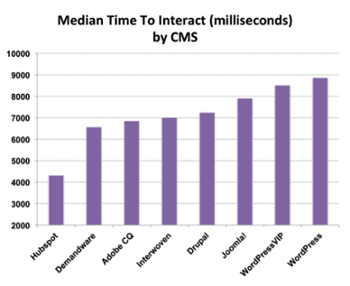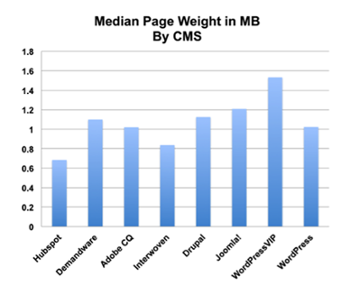This blog was initially published on 21 January 2019, and has been updated to reflect current, relevant content.
So, you've either already invested in HubSpot's software, or you're considering signing up. Regardless, you're ready to see your marketing deliver the best possible vlaue, right?
Here are the facts:
Data from HubSpot shows that customers who go all-in by moving their website into the HubSpot content management system (CMS) see on average:- Visits rise by 39% overall
- Visits from organic search rise by 70%
- Landing page submissions increase by 47%
- On these metrics, HubSpot Website customers outperform their peers by 10-20%
Full disclosure: We are strong supporters of the HubSpot CMS
We believe that great marketing, sales and customer service starts with a strong platform for growth. A platform, for us, is defined as [website + marketing software + sales software + service delivery software = platform]
Naturally, we can work with other sites, like WordPress, as HubSpot has a robust WordPress integration and indeed there are often good reasons to stay with your current CMS when bringing on other HubSpot Hubs. These could be anything from not wanting the added expense and impact on your resources when you've just built your new website on another CMS, to other budgetary restraints or technical reasons.
Let’s explore these obstacles a little further. We’ve put together a marketing, a business and a technical case for the HubSpot CMS Hub to help you decide whether now is a good time for moving to the HubSpot CMS.
Marketing's Considerations
You’re going to be spending a lot of time in HubSpot if you are a marketer. Welcome to your new home-away-from-home. Doesn’t it make sense to keep everything all in one place? You decided to go with HubSpot Marketing Hub so that you could get maximum functionality from one platform. HubSpot integrates your blog, landing pages, calls-to-action, social media, data, reporting, and your CRM in one tool so why wouldn’t you make use of HubSpot’s easy to use CMS Hub as well?
By building your website in HubSpot you get access to key tools for building your content and SEO strategy. Not only that but once you’ve mapped out your content strategy you can make use of HubSpot’s integrated on-page SEO tools to make sure you’ve got the best possible chance of ranking well. All this without the need for extra plugins!
If Google can complete your sentences for you and Netflix can tell you exactly what you want to watch, then the least your website can do for your visitors is personalise their experience. This is where HubSpot really comes into its own.
Because HubSpot is a CMS and CRM in one and because of HubSpot’s ability to use smart content, it’s possible to build user journey’s that map to your user’s buyer journey and personalise the content along the way based on what you know about them in the CRM. Not only that but by integrating bots and live chat you’re able to build a user experience your prospect won’t forget.
HubSpot CMS is easy for marketers to edit with a drag-and-drop editor that enables you to update and create pages without a developer. It also offers adaptive testing allowing you to test up to five different variations and automatically switching to the best-performing version.
If your company is global, you'll also get to know the multi-language content creation options. It allows you to easily manage the different language variations and optimise each one for SEO.
Business Considerations
1. Financial
Clients sometimes think that the HubSpot CMS Hub sounds expensive, but take a look at what it’s costing you to host your current site. Let’s make sure you’re comparing apples to apples though. From a hosting perspective, HubSpot is hosted in world-class, highly available and highly secure environments. Can the same be said of your currentsite? This is business critical technology and should be treated as such.
How much are you paying for your own server environment or hosting partner? How much does the maintenance and upkeep cost?
If you want your website to perform with the same functionalities as a HubSpot site, you'll need to pay for each function by purchasing an add-on or plugin. Multiple add-ons later, you’ll have the functionality and a similar cost implication equivalent to purchasing HubSpot CMS with all its bells and whistles. But, you’ll be missing out on the convenience HubSpot offers of everything under one roof.
2. Governance and compliance
For countries in the EU, data protection and storage have become key areas of consideration so GDPR has some bearing on your choice between HubSpot or your current CMS, largely in relation to the issue of data storage. Within HubSpot CMS your GDPR activities are seamless and easy to implement.
Activating your GDPR tools within HubSpot is literally the flip of a switch. Once activated you can quickly set up your cookies, customisable form fields, your privacy policy, your legitimate interest messaging and all opt-in functionality. All the content you need is already there and while you can tweak the copy to fit your tone, ultimately if you didn’t change a thing you’d still be completely covered and aligned to the GDPR requirements and regulations. No need for additional, laborious research on the legal jargon of GDPR compliancy.
3. Policy
Another question you need to ask yourself is "Who's going to be running my website?"
Internal policies regarding who manages your website should definitely be factored in when deciding on a choice of CMS. If your IT department is likely to be doing so, and they don't have a modern relationship with your marketing team, you may face a few struggles down the line.
Technical considerations
1. Unique Website Functionality
Depending on your business objectives and goals, you may require unique functionality from your website. Perhaps you run an eCommerce store or want to include a booking feature on your home page. It's not uncommon to find features like this available, or easily accessible, in an Open Source CMS like WordPress. Put simply – if your website has functionality on it that is only available with your current CMS, then stick to it!
HubSpot’s recent integration with Shopify has been a game changer and has successfully bridged the gap between online sales and marketing automation. Seamless data syncing between HubSpot and Shopify, product-based segmentation and automated ecommerce activities are just a few of the wins.
2. Performance
Your website’s speed is an important factor in ranking high on Google. Not only that but pageload times are critical to a good user experience. Take a look at Yottaa’s results for HubSpot vs other CMSs below.
 (Images: Yottaa)
(Images: Yottaa)
3. Security
There's an inherently massive gap in security between HubSpot and open-source CMS's like WordPress. For instance, in July 2015, users of the popular WordPress security plugin, Wordfence, experienced 16 000 attacks per minute. Something as important, and basic, as security can negate all other performance of the CMS but HubSpot’s numbers remain impressive and have held strong for a number of years.
Right out the box, HubSpot offers you:
- Provisioning of a standard SSL certificate.
- A global CDN built to handle high traffic volumes.
- Proactive customer notifications, which means you'll always be in the know regarding activity on your portal.
- Security teams that monitor platform and application behavior 24x7x365 for baked-in security – consider that HubSpot has achieved uptime of 99.99%, and you can see what a difference this makes.
- Reverse proxy support allowing you to create content and load all content from a single, trusted domain hosted externally.
- SEO and content strategy tools to help you improve your Google ranking.
- Serverless functions allowing you to add interactive elements without massive configurations.
- Code alerts to identify code errors.
Our Final Thoughts...
If you asked us about our personal choice of CMS, the answer would certainly be HubSpot. We're huge fans of its many features, and as an inbound agency, we've seen the success HubSpot users experience first-hand.
HubSpot as an organisation is all about growth. They provide a product growth suite that is constantly evolving, showcasing their growth and assisting their customers with growth too. Their CMS Hub is no different. They have made sure their CMS is quick to load, completely responsive and quick to delight so your customers not only want to return but they are also enjoying a valuable, personalised and sophisticated experience.
